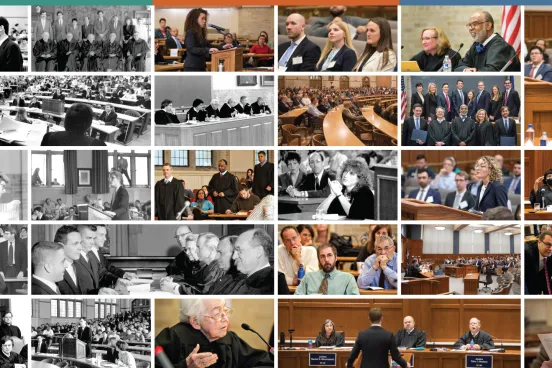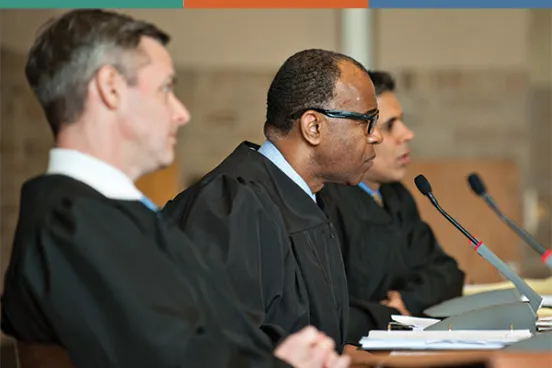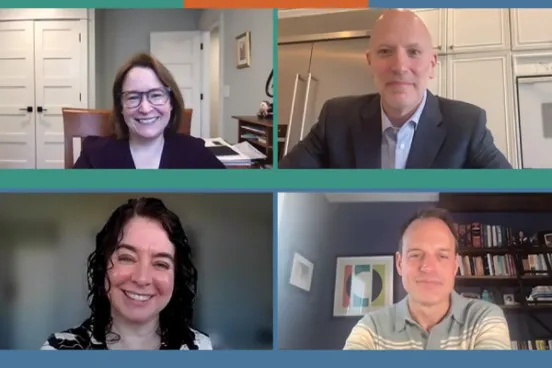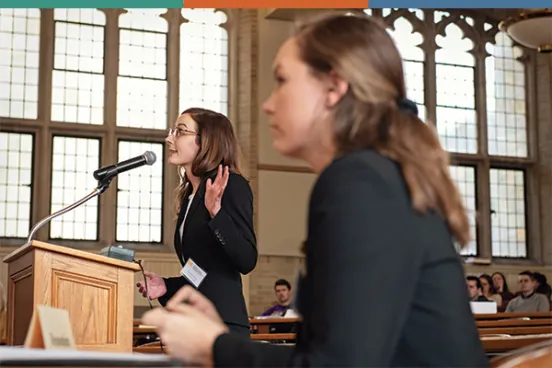While the Henry M. Campbell Moot Court is the Law School’s most enduring competition, it is far from the only opportunity for students to hone their skills. From trial advocacy to international, bankruptcy, and other areas of the law, students have a variety of moot court choices.
They need not be seasoned advocates to participate. Although the Campbell competition is for second- and third-year students, the Law School’s 1L Oral Advocacy Competition allows first-year students to practice their oral appellate advocacy skills in a low-stress environment. The competition kicks off at the beginning of the winter semester and ends with the final moot court in April.
Outside the Law School, students entered 14 competitions during the 2024–2025 academic year. Along with myriad other activities, many student organizations support their members participating in competitions.
“For some competitions, participation can change from year to year depending on the particular interests of the students,” says Alexis Bailey, ’17, strategic academic and co-curricular programs manager at the Law School.
She adds that three groups are dedicated to preparing for and participating in specific competitions.
“The Jessup and Vis international moot court competition teams and the Trial Advocacy Society are somewhat unique at the Law School. Competition participation is the whole mission of their organizations.”
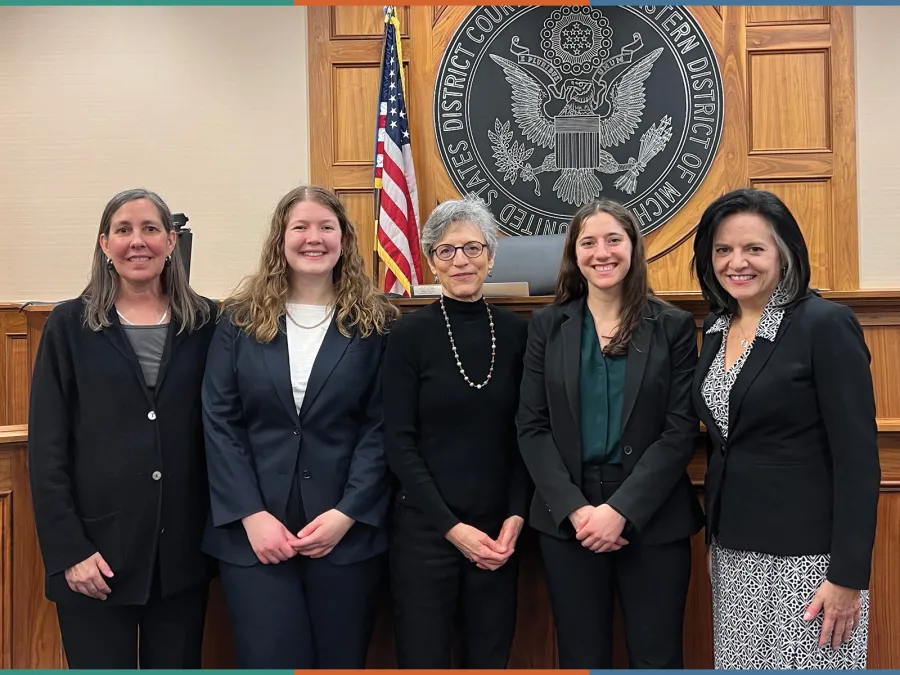
International law moot courts
A 10-person team of Michigan Law students participated in this year’s Jessup International Law Moot Court Competition, the world’s largest moot court.
“This year we went in with a completely new team,” says rising 3L Moamen Keshlaf, Michigan Law’s team captain. “We did pretty well with the amount of time we had and the capacity of the team.” Indeed, the team tied with Columbia for second-best respondent memorial after Harvard.
This year’s problem, composed by a team of international law scholars, addressed timely issues in international law, including the immunity of state officials from foreign criminal prosecution and the impact of receding coastlines due to climate change on maritime entitlements. A record-setting 800 teams from 105 countries and jurisdictions, including 93 teams from the US, argued before attorneys who served as judges. During the final round, two current and one former justice of the International Court of Justice decided the case, declaring Singapore Management University School of Law the winner.
While participation in the competition brings its own rewards, there is a practical application as well, says Emma Wilfong, ’25, who participated in Jessup for all three years of law school, most recently as an adviser.
“I'm going to a law firm after law school,” she says. “And I noticed in the summer when I was at my law firm, the skills that I used the most were managing my relationships with other people and how to effectively contribute to a team.”
Michigan Law alumnus Eric Bergsten, ’56, established the Willem C. Vis International Commercial Arbitration Moot Court in 1993 to foster the study of international commercial law and arbitration and provide training in resolving international business disputes.
A panel of arbitration practitioners and academics judges the competition, which involves writing memoranda for a claimant and respondent and presenting arguments in oral hearings. This year’s problem involved a dispute arising from the contested termination of a turnkey green hydrogen plant project. The University of St. Gallen from Switzerland was the winner.
After participating in pleadings via Zoom, four students from Michigan Law traveled to Vienna for the next stage of the competition.
“It's just an incredible experience to meet so many people from around the world,” says Ava Jones, ’25, who was a student coach in 2024–2025 and participated as an oralist in her 1L and 2L years. “You really expand your international horizons.”
Helping students throughout their preparation are several alumni who participated in the past and are currently practitioners. Their coaching is instrumental to the students, says Alexandra Zablocki, ’25, the team’s president. She adds that she relished the opportunity to focus on this year’s problem.
“You don't really get to focus for eight months on one specific problem in law school, delving into it and delving into the record,” she says. “And it's really nice to become an ‘expert’ at something that’s very rewarding.”

Other competitions
For moot competitions beyond the Law Quad, Vis and Jessup are the most established but far from the only opportunities. Michigan Law’s Trial Advocacy Society, a student organization, prepares students to participate in a number of tournaments throughout the academic year across a wide range of practice areas all over the country.
In 2024–2025, the organization sent teams to four competitions—which included a victory at the 17th Annual Capitol City Challenge (CCC) Mock Trial Competition. It was the first time a Michigan Law team won the CCC.
Teams from the Law School have seen success at a number of other recent competitions, including:
- Rising 2Ls Tara Abdullah-Nri and Ku'Juana Quinn placed second in the midwest regionals and qualified for the national round at the Thurgood Marshall Moot Court Competition, which is hosted by the National Black Law Students Association, during the 2024–2025 competition. They also received an award for best petitioner brief.
- A team from Michigan Law was a regional champion in 2024 at the Texas Young Lawyers Association National Trial Competition, which brings together more than 1,000 law students from 150 law schools.
- In 2023, a Michigan Law team was a regional champion and national quarterfinalist at the American Association for Justice Student Trial Advocacy Competition
Michigan Law students have participated in a number of other moots on a wide range of topics and practice areas in recent years, including the:
- Judge John R. Brown Admiralty Moot Court Competition
- Cardozo FAME Center Intellectual Property Law Moot Court Competition
- John L. Costello National Criminal Law Trial Advocacy Competition
- Duberstein Bankruptcy Moot Court Competition
- Saul Lefkowitz Moot Court (International Trademark Association)
- Law and Economics Center Annual Invitational Antitrust Moot Court Competition
- Manfred Lachs Space Law Moot Court Competition
- Jeffrey G. Miller National Environmental Law Moot Court Competition
- National Health Law Transactional Competition
- National Native American Law Students Association Moot Court Competition
- Giles Sutherland Rich Memorial Moot Court (American Intellectual Property Law Association)
- Tulane Pro Football Negotiation Competition and the Tulane International Baseball Arbitration Competition
- Robert F. Wagner National Labor and Employment Law Moot Court Competition


